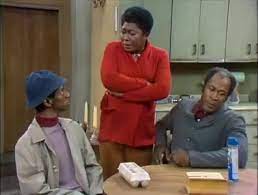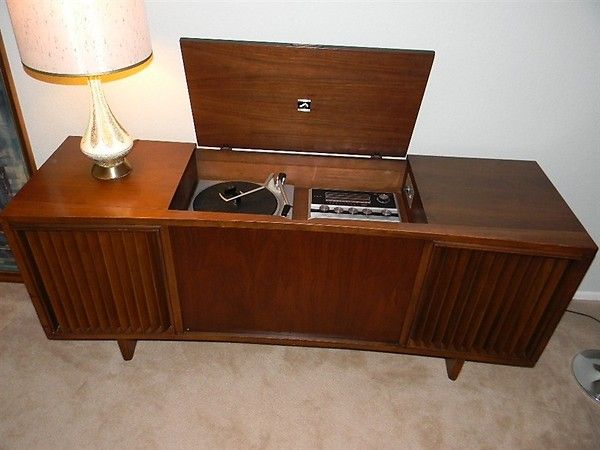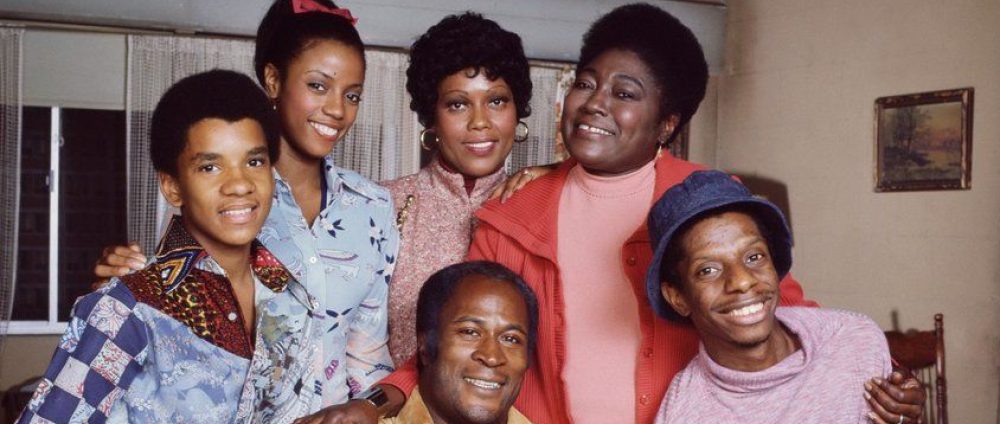
The family is fed up with what Florida terms “the worse run building in this whole project” – the elevator is out of order (causing the family to walk the 17 flights of stairs to their apartment), the refrigerator is on the fritz, the water isn’t running, and the heat isn’t on (it’s so cold that J.J.’s chattering teeth “sound like a crap game.”) When a letter written by Michael about the project’s conditions appears in the local newspaper, a bigwig from the Housing Department, William Stonehurst, pays a visit to the Evans home. He’s forced to stay in the apartment when his taxi flees the area following a gang fight; his initial annoyance over the negative publicity generated by the letter transforms into understanding and compassion when he gets his first-hand experience with a family living in the projects. The Evanses are excited when Stonehurst promises that he will address all of their issues, but their hopes are dashed when they’re informed that it will take “13-14 months, tops!” Still, in typical Good Times fashion, the episode ends on a high note when Florida discovers that the water is working and James jokes that he can now “take a bath in [his] overcoat!”

This episode is fascinating in its honest depiction of the racial and cultural chasm between the Evans family and the white administrator, beginning with Stonehurst’s astonishment at the difficulty he had finding a taxi that would take him to the projects: “Every time I told them where I was going, they turned on the ‘Off Duty’ sign and slammed the door in my face!” There are numerous inadvertent verbal gaffes on the part of Stonehurst, as when Florida deduces that he hasn’t been around many black families and Stonehurst shares that he does have a “colored – er – Neg – BLACK maid.” And there’s a rather poignant moment when James offers Stonehurst a glass of Muscatel to wash down his aspirin and Stonehurst surreptitiously (he thinks) wipes off the rim of the glass before taking a drink. James notices this microaggressive insult, and without saying a word, conveys a world of meaning. But despite Stonehurst’s position of power, the family manages to exact satisfaction by ridiculing him without his even being aware of it. When he first enters the Evans apartment, Stonehurst realizes that he forgot to introduce himself, adding “I don’t live here.” And without missing a beat, Florida sweetly replies, “Oh, I would have never known that.” It’s an episode that serves up a combination of grim reality and smart humor and, for my money, it’s one of the best of the series.
Pop Culture References:
Arab Oil Embargo
As the episode begins, J.J. is painting a picture of Thelma, but she soon becomes frustrated and threatens to stop serving as his model. If she quits, J.J. tells her, she will forfeit the concert tickets that J.J. promised in exchange for her services. When Thelma balks at J.J.’s extortion techniques, her brother responds that “it’s me and the Arabs running the world.” This is another reference to the country’s gas problem, previously discussed in the pop culture section in my post on Season 1, Episode 3.

Gas Rationing
Later in the episode, when the family discovers that the water isn’t running, J.J. jokes that they will have to start using the restroom at the gas station: “We’re only going to be able to go on odd-numbered days.” He is referring to the gas rationing that resulted from the oil embargo, which included an odd-even system based on license plate numbers; if the last digit on your license plate was an odd number, you could only get gas on odd-numbered days.
Wilt Chamberlain
After Thelma sees J.J.’s painting of her, she objects to the depiction, complaining that in the portrait, she’s seven feet tall and “looks like Wilt Chamberlain.” Chamberlain was a seven-foot, one-inch basketball star who joined the National Basketball Association (NBA) in 1959, when he signed on with the Philadelphia Warriors (which later relocated to California to become the San Francisco Warriors). During his career, he would also play for the Philadelphia 76ers and the Los Angeles Lakers and would play on two NBA championship teams. Chamberlain retired from basketball in 1973.
Marvin Gaye
The tickets that J.J. promises Thelma are for a Marvin Gaye concert. A singer and songwriter, Gaye exploded onto the pop music scene in the 1960s with solo hits like How Sweet it Is (To Be Loved By You). He also formed a popular duo with singer Tammi Terrell, topping the charts with such tunes as Ain’t No Mountain High Enough and You’re All I Need to Get By. Gaye made several concert appearances in 1974, his first since 1969.

Hi-Fi
When Thelma is posing for J.J.’s picture, she suddenly starts dancing, explaining that she’s moving to “the music in my head.” J.J. jokes, “There is room for a hi-fi up there.” Hi-fi is short for “High Fidelity,” and technically refers to a higher reproduction of sound. But in the 1950s through the 1970s, a “hi-fi” commonly referred to a rectangle-shaped piece of furniture that contained a record player and radio inside, with four legs and speakers on the front. The top of the hi-fi lifted up to provide access to the record player and radio, and the furniture was made out of wood, like walnut or maple. They were also known as stereo consoles. (My family had one in our living room when I was growing up. I don’t know what happened to it, but I sure wish I had it today!)
Answering Machines
When Florida decides to call the project manager to report the plethora of problems in their apartment, Thelma cautions that she will simply reach a recording that says, “Leave your message after the sound of the beep.” Thelma is referring to an answering machine, a device that supplied a recorded answer to a phone call and could record a message from the caller, generally after the sound of a beep tone. While answering machines were available in 1974, they were still somewhat of a novelty at that time and did not become common in U.S. homes until 10 years later. (Although they’re all but obsolete today, I still have one!)
Mayor Richard J. Daley and Muhammad Ali
Florida does, indeed, reach an answering machine, prompting J.J. to take the phone and issue the following threat: “Either you get this project into A-1 condition, or I shall see to it personally that you are out of a job . . . this message is signed Mayor Daley or Muhammad Ali – whichever scares you the most!” At the time that this episode aired, Chicago’s mayor was Richard J. Daley, who had served in the city’s top office since 1955 (and would remain mayor until he died in office in 1976). Once described as “the most powerful local politician America has ever produced,” Daley wielded his power statewide and on the national level as well. Former heavyweight boxing champion Muhammad Ali was a resident of Chicago until the mid-1970s; in January 1974, he defeated Joe Frazier, against whom he’d suffered his first professional defeat three years earlier. In fall 1974, in the famed “Rumble in the Jungle,” Ali would fight the current heavyweight champion, George Foreman, and regain his crown.

Acrilan
Willona enters the episode after climbing 17 flights from the building’s laundry room with her basket of clothes. She complains that only one of the dryers was working. “You wanna see how it was working? Look at it,” she says, holding up a shredded sweater. “Ten percent Acrilan, ninety percent confetti.” Acrilan was the brand name for a synthetic acrylic fabric, characterized primarily by softness, strength, and wrinkle-resistant properties used for clothes commonly known as “wash and wear.” In fact, Florida responds to her friend with a play of words on this popular type of garment: “I know the machine you got. It’s the one with that special cycle: wash and TEAR.”
Chicago Defender

Michael arrives home to excitedly announce that the Chicago Defender has printed a letter he submitted, in which he complains about the conditions in the projects. (“They are becoming a slum,” he says in part.) The Chicago Defender is a newspaper targeted toward the black community, founded in 1905 by Robert Abbott in the kitchen of his landlord’s apartment. After just five years, the paper began to attract a national audience, waging a campaign against Jim Crow racism, promoting anti-lynching legislation and integrated sports, and encouraging the country’s Southerners to move to the North. Over the years, such luminaries as Langston Hughes, Gwendolyn Brooks, and Ida B. Wells wrote for the paper. Since 2019, it has been an online-only publication.
Guest Stars:
Richard B. Shull (William Stonehurst)

Popular character actor Richard Bruce Shull was born in Evanston, Illinois – a suburb of Chicago – on February 24, 1929. He got his first big break in 1970 when he was cast in the Broadway production of Minnie’s Boys, a musical about the Marx Brothers starring Shelley Winters. He went on to guest on a variety of popular television series, including Love, American Style, Ironside, and The Rockford Files, and he co-starred with John Schuck in Holmes and Yoyo. He was also in such films as Klute (1971), Garbo Talks (1984), HouseSitter (1992), and Private Parts (1997), and was nominated for a Tony Award and a Drama Desk Award for his performance in Broadway’s Good Time Charlie. Shull was appearing on Broadway in 1999 in Epic Proportions when he suffered a fatal heart attack. He was 70 years old.
Other Stuff:
When Michael tells his family about his letter being printed, James asks, “You puttin’ us on, boy?” This gives Michael the opportunity to once again offer up the catchphrase that he originated in the first episode, when he tells his father that “’boy’ is a white racist word.” He says it again later in the episode when Stonehurst refers to him as a boy – at least, he says part of it before Thelma claps her hand over his mouth. For whatever reason, the audience wouldn’t hear this phrase for much longer.

Another brief reference to Florida’s weight finds its way into the series when James gives his wife a hug and tells her, “I sure am glad I got me an ample woman to sleep with tonight.”
When Florida shares what the family is having for dinner – “soul food,” as Stonehurst identifies it – Michael pipes up that their diet has “too much starch, and not enough vitamins and proteins.” This is the start of the series’ tendency to include factual socio-economic information in the episodes. More on this later.
One of my favorite laughs comes when Michael stands on a chair to proudly read his letter to the family, which concludes, “Signed, Michael Evans, Esquire.” James gives him a look of disdain and says, “You better get your Esquire off that chair.” Gets me every time.
~ ~ ~
The next episode: Springtime in the Ghetto . . .
